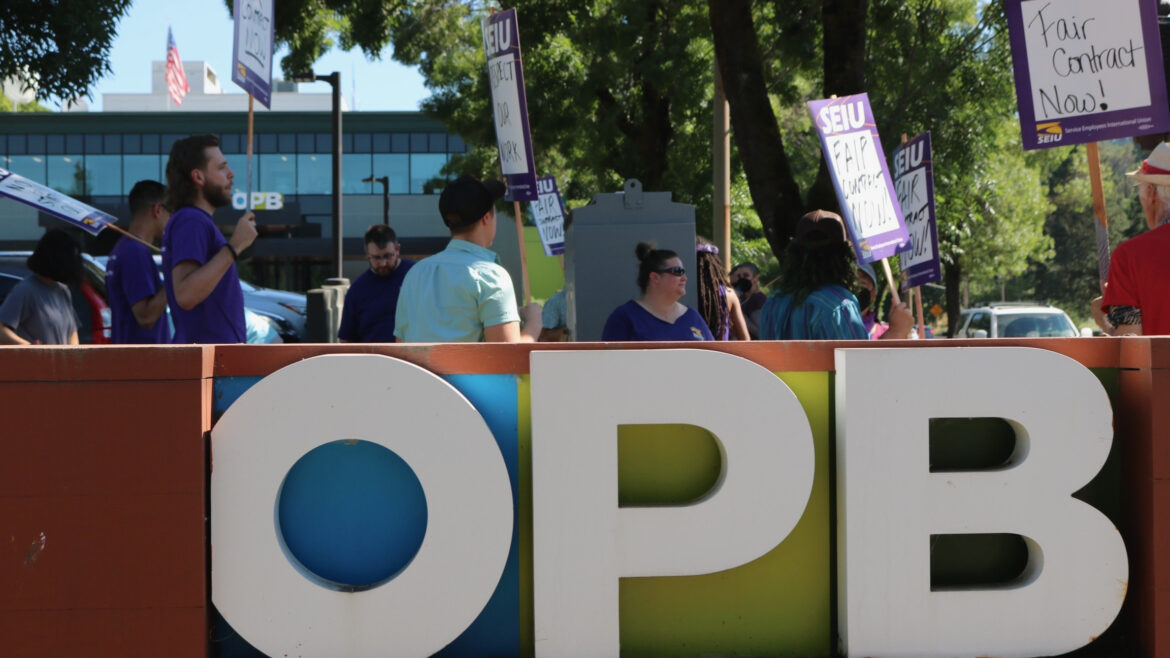OPB union members picket as contract negotiations stretch into fourth month

SEIU Local 503
SEIU members picket outside OPB's headquarters Aug. 2.
Unionized workers at Oregon Public Broadcasting are going public with frustrations over the bargaining process nearly six weeks after their contract expired.
The Service Employees International Union Local 503 represents more than two dozen OPB employees working in engineering, operations, IT, administration and member services. Workers held an informational picket Aug. 2 outside OPB’s Portland headquarters.
Front desk worker Zia Laboff said union members were hopeful going into bargaining this spring, in part because new people are at the table on behalf of OPB.
“And OPB has been, inwardly and outwardly, doing a lot of work around diversity, equity and inclusion … so we were really hopeful that those DEI values would be brought to the table as well, and so far we have felt that that has been a bit lacking,” Laboff said.
One sticking point is a merit-based compensation increase strategy that was part of the last three-year contract, which expired June 30. That set aside 3% of total salaries within the bargaining unit for merit raises and required that each employee receive at least a 1% pay increase in 2020 and 2021. Each employee received a flat 4% pay increase when the agreement was signed in 2019.
Laboff said the union wants to move away from merit-based raises linked to annual performance reviews because they leave room for bias and favoritism.
According to master control technician Catherine Switzer, OPB has used several different performance-review systems in the 39 years she has worked there, and even glowing reviews haven’t always translated to higher pay raises.
“It’s always going to be based on how well you get along with your other coworkers, how you get along with your boss,” Switzer said. “It’s more of a reflection on the managers of that division in that department as to whether they’re doing what they need to do to get that employee motivated and excited again about their job.”
Merit-based compensation systems are often seen as a best practice, and there is evidence that they can help motivate and retain employees. However, some academic research suggests these systems might actually increase gender disparities.
Laboff and Switzer also said union members were excluded from a $1,000 stipend that nonunion employees received July 1. Laboff said that stipend, along with higher cost-of-living increases, would go a long way toward resolving issues that have stalled negotiations.
“We’re hearing from our membership that they’re struggling to choose between food and gas,” Laboff said.
OPB declined to participate in an interview or answer questions via email, citing the ongoing bargaining process. In a statement, CEO Steve Bass said:
OPB is committed to maintaining an equitable work environment of mutual respect and dignity. We value all our employees — represented and unrepresented. Additionally, we are committed to resolving differences with SEIU at the bargaining table and to follow the complex regulations that govern bargaining processes. For those reasons, we do not share details of the proposals being made or conversations happening at the bargaining table with those who are not directly involved with the negotiations. Our approach should not be construed as an agreement with SEIU’s characterization of what has transpired during negotiations. Rather, this is one way we demonstrate our respect for the bargaining process. We will continue to bargain in good faith to reach an agreement as soon as possible.
A 20-year union steward, Switzer gives OPB credit for its DEI work and efforts at increasing transparency. Like Laboff, it made her optimistic about what might transpire at the bargaining table.
“I always hope that it’s going to be different, that we’re going to turn that corner and it’s not going to be adversarial, it’s going to be a handshake,” she said.







This may not be relevant, but it probably is: OPB is consistently the number 1 station in AQH in Portland pretty much every month. If they’re not #1, they’re almost always #2 (rarely #3). They absolutely dominate that market by AQH/share. Not necessarily by cume, but regardless – their ratings are really good. In theory, that should be translating into very healthy revenues. And therefore that should be translating in pretty good pay/benefits.
It’s important to remember that there’s a lot of “shoulds” in there. But if OPB management is pleading poverty in their negotiations…and they have the numbers to prove it…then I kinda have to assume either their employee roster is featherbedded too much (or their expenses are otherwise excessive), or their revenue staff is underperforming. No matter what, there’s a larger problem in play here. Overall ratings that good SHOULD mean plenty of money to go around. And if it doesn’t then something else…something pretty large…is wrong with the organization.